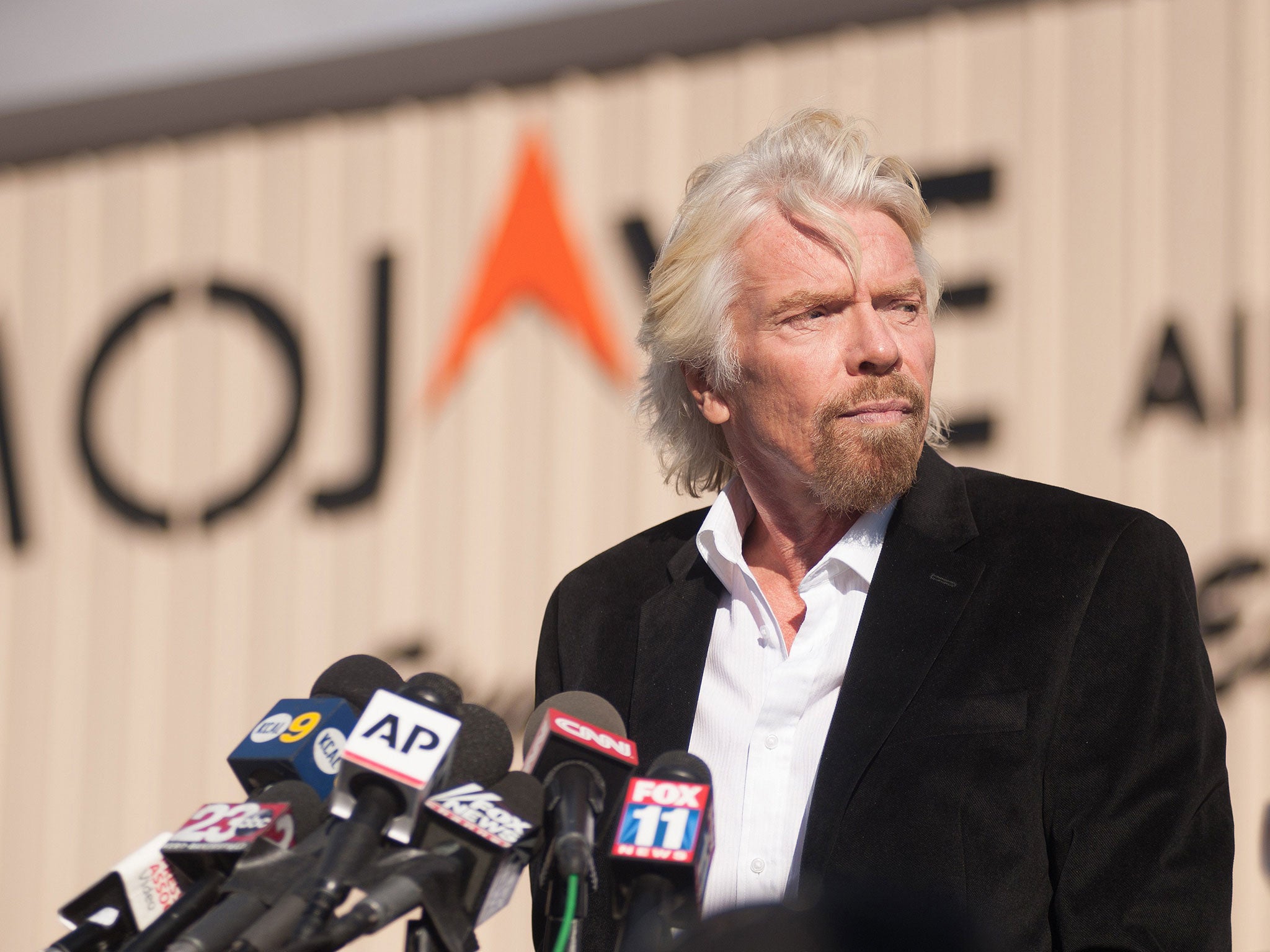Whatever his failings, Branson is a role model for entrepreneurs
In the wake of the Virgin Galactic crash, there's a reason why his pioneering brand looks set to survive


Nothing takes away from the personal tragedy, but equally nothing seems to take away from the strength of the brand. The brand of course is Virgin and its creator, Sir Richard Branson, is Britain’s most admired business leader. Yet his businesses seem to break all the rules: rules such as focusing on markets and activities you know something about, or having a clear corporate governance and ownership structure, or paying attention to succession planning – all the stuff that conventional business does.
No rational business would attempt to span such disparate activities as airlines and banking, yet Virgin is doing so. The flotation of Virgin Money on the London Stock Exchange is going ahead later this month. No mainstream company would risk attaching itself to as risky a venture as space travel.
It may be a sprawling business empire – lots of different companies, all with different ownership structures – but to have assembled them and maintained a stellar reputation is an astounding achievement. It is an achievement that tells us a lot about public attitudes to business.
In Britain, at least, there are few business heroes. On TV, business executives are frequently portrayed as greedy or unethical. In adverts, the boardroom is populated with elderly white males and we’re invited to sneer at them.
Yet we admire entrepreneurs. If people build up their own business and get extremely rich as a result, that is all right. If they run an existing business and get moderately rich, that is all wrong. We don’t envy Branson his hideout on Necker in the British Virgin Islands, we admire him for it. As the PR blurb for a competition with four nights on the island as its prize puts it: “Sir Richard Branson epitomises everything we all love about a dreamer. He inspires us to believe that dreams do come true and it is incredible that he will help two lucky people experience the nearly impossible with this Necker Island experience.”
The closing date for that one was yesterday, so dreamers will have to figure out some other way of going there. But you see the point. Give people the feeling that you will make their dreams come true and you will indeed become a business hero to them. That is Sir Richard’s genius.
Or at least it is one half of it.
I have only had the tiniest of business dealings with him and that was many years ago when I was business editor of another newspaper. It was a phone conservation and he was most apologetic about something. “I just hadn’t focused on this.” Though it turned out it was too late to do anything about it. There was huge charm and a sense of wanting to do the right thing. But as someone who has dealt with him a fair bit told me, alongside the wall of charm is the eye of cobra.
Branson is an adventurer in all ways and we admire him for that. But he is quick to lay off the risks whenever possible, and shut things down if they don’t seem to be working. It is his Virgin brand but it is mostly other people’s money.
And there are reverses. There are well-known ones, such as Virgin Cola and Virgin Brides, and even Virgin Atlantic has struggled. It was formerly part-owned by Singapore Airlines, but it said it had under-performed and sold its stake to Delta. Virgin Atlantic has lost money in three of the past four years. Just a month ago, Virgin said that its domestic feeder airline, Little Red, would close next year.
As for Virgin Galactic, it is 38 per cent owned by the sovereign wealth fund of Abu Dhabi, and the New Mexico state government has invested some $200m in the base facilities at Spaceport America. As has been widely publicised, hundreds of the flights have been pre-sold. Alongside the derring-do is great financial caution.
There nothing wrong with this. Most great businesses have been built by a combination of promotional genius and financial caution – often a partnership between two people, a salesman and a bean counter. In Branson they happen to be in the same person.
Branson’s greatest contribution surely is not what he has done in his businesses, for his record in creating sustainable enterprises is less impressive than his record in making money for himself and his family. He is less a great innovator, more a great showman. But that showmanship does contribute to the way business is seen by the rest of us.
He has helped make entrepreneurship both fashionable and fun. We benefit in Britain from that, even if he sits in the Caribbean. His dream of affordable (well, affordable to a few) space travel may be a distant vision. Some of us may admire the meticulous attention to service by, say, the John Lewis Partnership, more than the publicity stunts of Virgin.
But promoting the idea that anyone can start a business is a huge achievement and whatever happens to the different parts of the Virgin empire, we should salute him for that.

Join our commenting forum
Join thought-provoking conversations, follow other Independent readers and see their replies